Search Results
Showing results 601 to 620 of 773
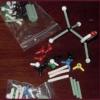
Molecular Menagerie
Source Institutions
In this activity, learners use molecular model kits to construct familiar molecules like lactose, caffeine, and Aspirin.
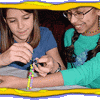
Wear a Chimp on Your Wrist
Source Institutions
Learners construct a bracelet containing two strands of beads, which represents a double strand of DNA that codes for a gene. They match beads to the bases in a section of a chimp's DNA code.
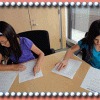
Read With Your Fingers
Source Institutions
In this activity, learners work in partners to create and exchange messages written in Braille. Learners use a Braille key and thumbtacks to write their messages in Braille.

Identify Your Fingerprints
Source Institutions
Learners roll their fingerpads in ink pads, and then press their fingerprints onto balloons. Learners inflate the balloons to produce enlarged versions of their fingerprints.

The Rain Man
Source Institutions
In this activity, learners observe the hydrologic cycle in action as water evaporates and condenses to form rain right before their eyes.

3D-tection: Trying to Fit In
Source Institutions
In this activity, learners explore how molecules must fit together, like a lock and key, in order to identify each other and initiate a new function as a combined unit.
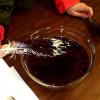
Find the Best Way to Clean Oil off Bird Feathers
Source Institutions
In this experiment, learners examine the way oil affects bird feathers and test different cleanup methods to find out which works best.

Sock It To Me
Source Institutions
In this activity, learners discover how sweating makes us feel cooler. Learners put on one damp sock and one dry sock and sit in front of a fan.

Spin Art
Source Institutions
Make your own spin art device using an old record player! Notice patterns and effects the spinning movement has on your work. When finished, post your work to the Spin Art Gallery!
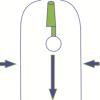
Cartesian Diver
Source Institutions
In this quick activity (page 1 of the PDF under SciGirls Activity: California Fish), learners will build a simple Cartesian Diver in an empty 2-liter bottle.

Outdoor Explorers
Source Institutions
In this activity, young learners go on a walk with caregivers and use their senses to observe nature with the help of scavenger hunt sheet.

Spinning Cylinder: Make a triangle appear on a spinning wheel
Source Institutions
Spin a short piece of PVC pipe that's been marked up, and watch a triangle appear. Enjoy this optical illusion from the Exploratorium's Science Snack series.

Mission: Control!
Source Institutions
In this activity and game, learners will train to improve balance and spatial awareness by performing throwing and catching techniques on one foot.

Popsicle Bridge
Source Institutions
In this activity, learners explore how engineering has impacted the development of bridges over time, including innovative designs and the challenge of creating bridges that become landmarks for a cit

Make a Green Gumball Black
Source Institutions
In this optics activity, learners use a shoebox, colored cellophane and sunlight to "change" the colors of gumballs. Learners will be surprised when the green and blue gumballs appear black!
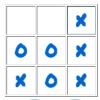
Tic-Tac-Toe
Source Institutions
In this online version of the classic paper and pencil game, learners practice looking ahead to anticipate an opponent's move.

Slide Whistle
Source Institutions
In this activity, learners build a slide whistle using PVC pipe, bamboo skewer, and piece of foam. Construction of the instrument is relatively simple.
Tree Poker
Source Institutions
In this activity (p.14-15 of PDF), learners discover the concepts of competition and limiting factors as they relate to plant and animal communities.

The Turing Test: Conversations with Computers
Source Institutions
This activity aims to stimulate discussion on the question of whether computers can exhibit “intelligence,” or are ever likely to do so in the future.

Exploring Fabrication: Self-Assembly
Source Institutions
In this activity, learners participate in several full-body interactive games to model the process of self-assembly in nature and nanotechnology.
